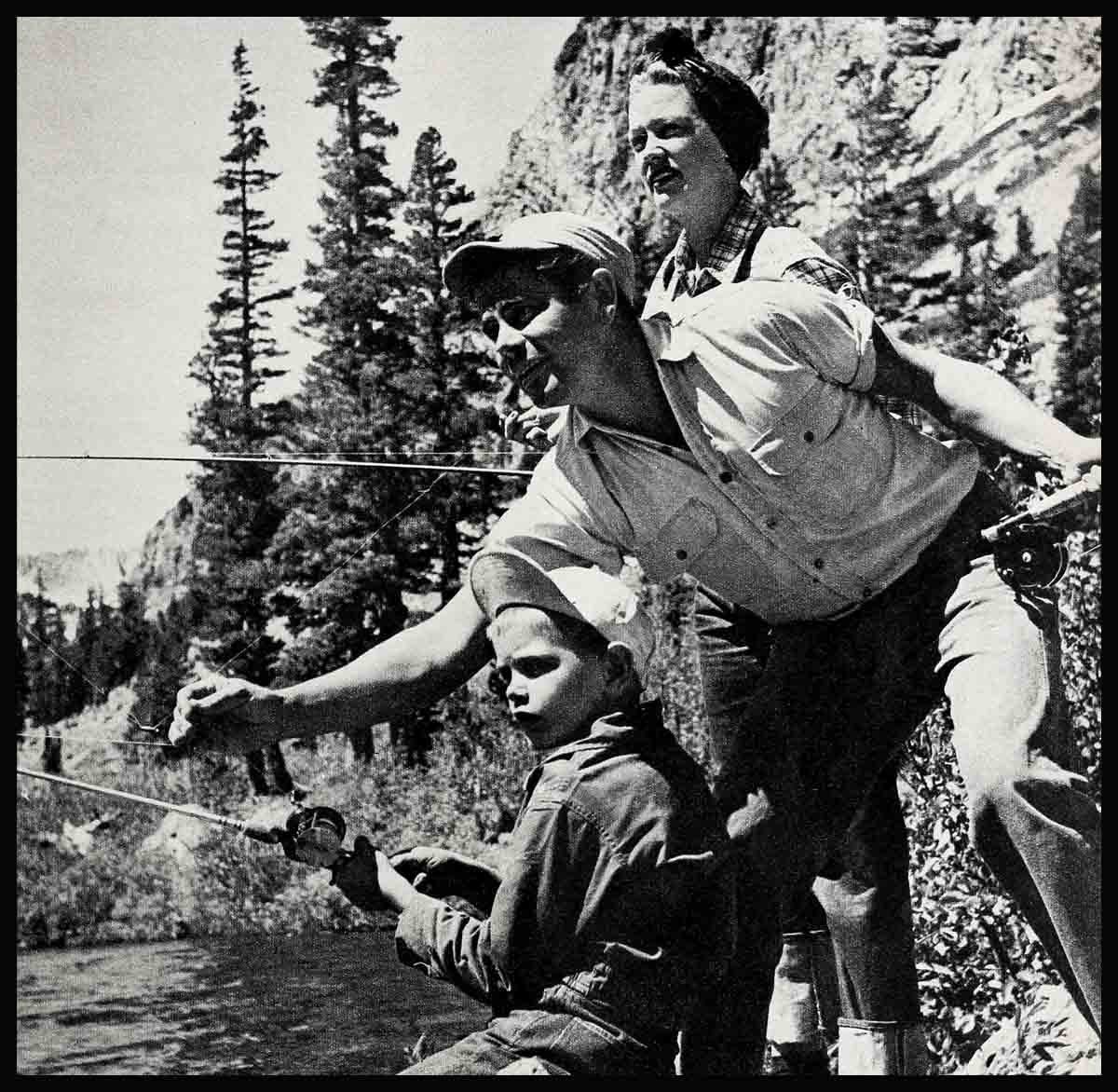
Secrets Behind Hollywood Heartbreaks—Glenn Ford & Eleanor Powell
ELEANOR POWELL
On an October evening back in 1944, a solemn young couple stood side by side in the flower-decked living room of the bride’s Beverly Hills home. Softly, in words barely audible except to each other, they repeated the marriage vows. “Only once before in my entire thirty-five years in the ministry,” said the Reverend Ray Moore afterward, “have I ever performed a ceremony where the strength of feeling between two people was so marked.
“Standing there, so straight and tall and so deeply in love, they were a symbol of everything fine and good and clean in this world.”
This was the wedding of dancing star Eleanor Powell and Glenn Ford, actor turned Marine sergeant. It was a wartime marriage, and their love seemed the only stable thing in a world of confusion. In the year of 1952, confusion in full force seems to have entered the lives of the Glenn Fords.
There were hints of trouble as far back as 1946, when Glenn came home from the service and made “A Stolen Life” and “Gilda.” At that time, he admitted that a few adjustments were being made in the household. “But we’ve never discussed anything so drastic as parting,” he said.
Lately the rumors have been revived. There are those who insist that Eleanor at one point not only consulted a lawyer, but was bent on filing for divorce, when Glenn somehow managed to persuade her to give their marriage another try.
Recently the story of a quarrel reached the papers. The accounts were many and varied. One reporter said that Glenn had left home and Eleanor confessed that she didn’t know where he was. Another stated that it was merely a foolish quarrel such as many couples have, and that he hadn’t left home at all. There have been rumors of Glenn’s interest in other women. However, all actors are subject to such rumors.
At this writing, Glenn and Eleanor are reported to be living peacefully under the same roof. To still the growing number of separation stories, they left Hollywood, and together with son Peter, drove to the mountains on a fishing trip. However, friends have seen little of Eleanor in the past few months. They called in vain to invite her out while Glenn was in Europe making a picture.
When Glenn married Eleanor he extracted a promise that she would give up her career. She was on top. All her life she had worked and struggled to achieve her fame. It was a difficult decision to make. Eleanor, a warm-hearted, sentimental girl, confided to friends, “I’ve danced nearly all my life. I’ve lived in hotels, on trains, out of a trunk. I’ve never really had a home, and Glenn wants this more than anything else. I think what I have to gain is much greater than what I am giving up.”
Even after Peter was born, wonderful offers continued to pour in for Eleanor. A fabulous one came from South America. The London Palladium wanted her. It would have been easy for Eleanor to return to work then. Peter was too young to miss her. They needed the money badly. But, to Eleanor, such a move was out of the question. She was Mrs. Glenn Ford, wife and mother.
Glenn had first become aware of his future wife in 1938, when she was dancing on the New York stage in “At Home Abroad.” The then unknown Ford sat in the balcony and watched—entranced. Across the street Eleanor was also dancing in “Broadway Melody” on screen.
Actor Pat O’Brien played cupid when Glenn was working in his picture called “Flight Lieutenant.” Between scenes, Glenn had confided that he was looking for a girl who wasn’t “shopworn.” A girl who loved a home and family. A girl who liked a quiet, normal life. He “casually” mentioned Eleanor. So Pat invited the couple to a party at his home.
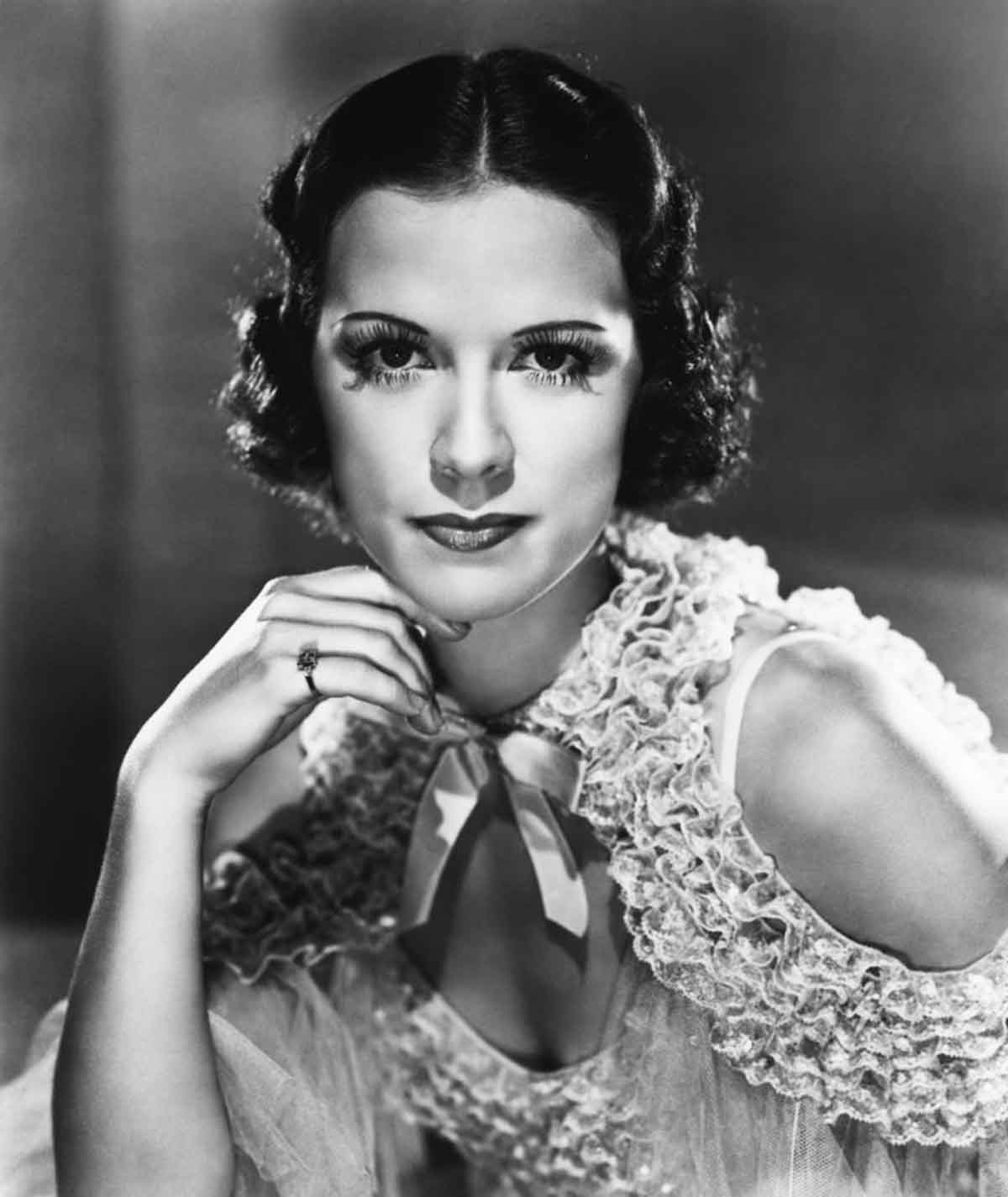
They were engaged for over a year. And at the time they were married, Glenn said, they wanted an old fashioned kind of marriage. Eleanor, who had worked so long and so hard, would retire to raise a family and run a happy home. There are those who believe that it was also a matter of pride with Glenn. A man isn’t comfortable when his wife makes ten times the salary he can command. And so when offers of dancing engagements kept pouring in, they fell on deaf ears. Eleanor was contented with her life. But not so, Glenn. Ambition gnawed. His three years in the service had interrupted his career and he was determined to catch up.
Fate in the form of Bette Davis entered the picture. Unable to get Henry Fonda for “A Stolen Life,” she tested Glenn. His immediate click in this picture sent him right into “Gilda” with Rita Hayworth. This boosted his stock sky high. In the meantime, Glenn had grown more restless with his life. He wanted to live better, to expand, and the general impression was that he was no longer the simple, frightened “kid” whom everyone felt sorry for and wanted to help.
One day Glenn came home. “I’ve found our new house,” he announced to Eleanor’s unbelieving ears. They did need more room, she knew. They really weren’t in a position to go into debt, but—if Glenn wanted it—Eleanor got into the car and drove with Glenn to Beverly Hills. When they stopped and she saw the house, her heart sank. It was an estate. Three-and-a-half acres of fruit trees, gardens, a swimming pool—and for neighbors, Charlie Chaplin and Fred Astaire. The price was reportedly over $100,000.
Glenn was elated. The house came completely furnished. There was a special housekeeping suite where Glenn could study. It was just what he wanted. And so Eleanor wanted the house too.
Marriage, after all is a partnership, and her friends say she felt she would be able to do her bit to help pay for the house. But she was leery of the idea of dancing again. To one of her good friends she confided, “When I quit I was champ in my line. I was on top. Now we’ve had a war. Night club business is bad. How do I know people will even remember who I am?”
However, against great odds, Eleanor went into the Beverly Hills Club in Cincinnati. She broke all records. Previous to this she had opened in Buffalo, danced at Las Vegas.
Rumors began again that there was trouble with the Glenn Fords. One columnist even printed that Eleanor Powell had better come home and take care of her family—if she expected to find a family waiting for her. Another sympathized with the lonely figure of Glenn while his wife was away “taking bows and hearing the plaudits of the crowd.” It nearly broke Eleanor’s heart.
From this time on the rumors grew, and rumors have a way of multiplying. It was reported that both Glenn and Eleanor were unhappy. It was intimated that they had never been meant for one another, that in the first glow of love, Hollywood spectators had overlooked the fact that Glenn and Ellie are opposites in many ways—especially in their relationships with other people. Normally, Ellie is a very gay, friendly, enthusiastic and talkative person. Glenn is retiring and uncommunicative. When she is out socially, she always appears to be enjoying herself, whereas Glenn seems unhappy.
But then the things Glenn and Eleanor do have in common are often overlooked. Their backgrounds are similar. Both are from small towns and prefer a quiet, simple life. Each is an only child and they have both always been exceptionally devoted to their mothers. As children they were painfully shy. Yet both assumed family responsibilities early in life. Essentially they are the same kind of people. They love their son and, more than anything, want to give him a happy home.
From the beginning, Glenn and Eleanor have shared a belief that a perfect marriage is built on a foundation of love. If they remain together, perhaps their next—ten years will find this belief and their love growing even stronger.
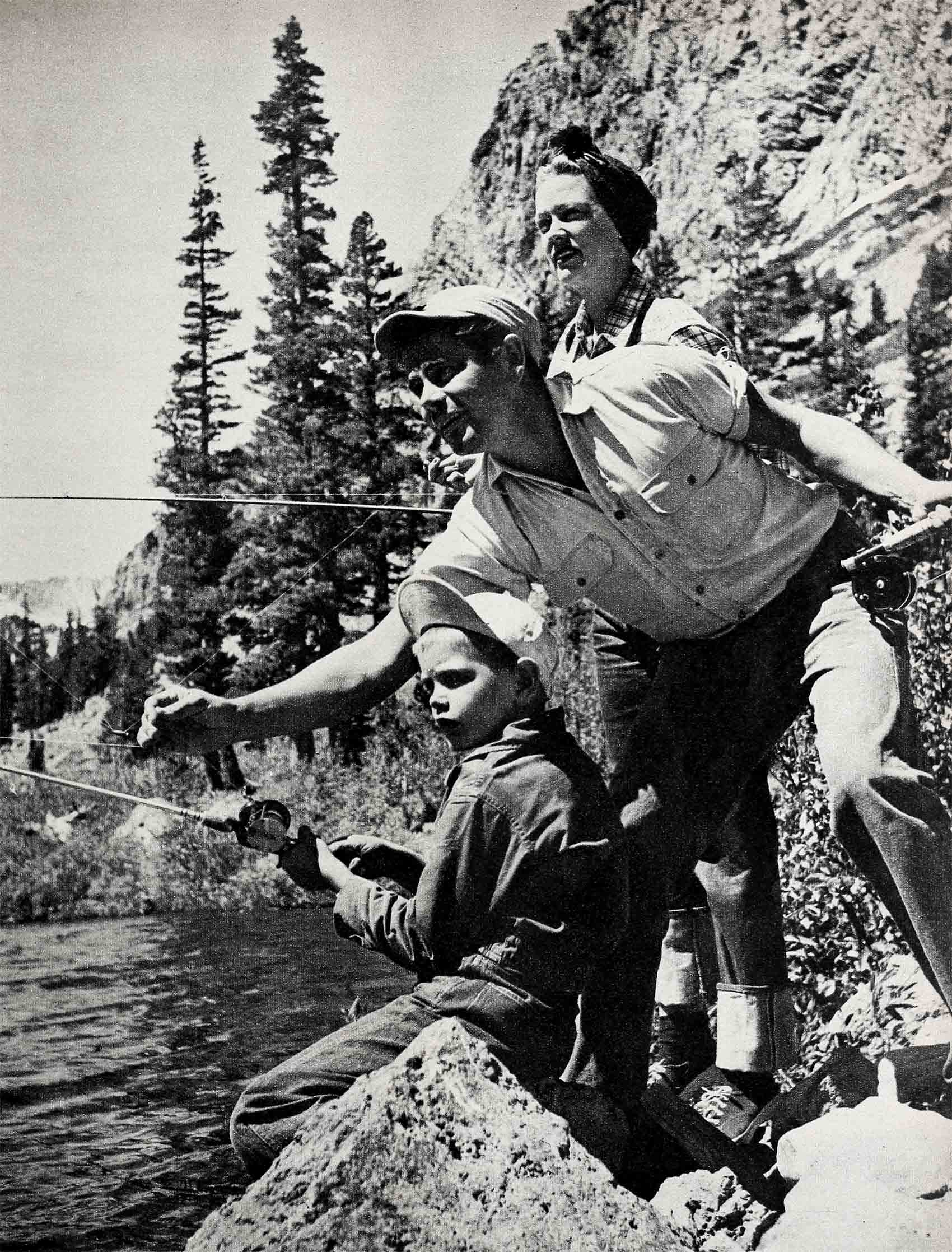
GLENN FORD
It happened a long time ago. A tall, gangly youth was perched high on the roof of the Wilshire Theatre in Santa Monica. He wore an ill-fitting raincoat to ward off the rain. His face was eager and tense as both hands hung onto a huge twisting searchlight that swept the sky. Thus he clung for four hours each night, twisting the light that guided theater-goers to the box office below. For his services, he got to see the show—free! Each night he could lose himself in the magic world of make-believe—the world that one day was to be his world if it took the last ounce of his being.
Gwyllyn Samuel Newton Ford from Glenford, near Three Rivers in Quebec, didn’t have to grow taller. But he did become older and wiser and one day, as Glenn Ford, he appeared in a Paramount short called “A Night in Manhattan.” This time there was no free movie for his services. For his acting chore, he received the magnificent sum of twenty-five dollars, and never before or since has he been so genuinely thrilled. The rest is now Hollywood history.
Glenn Ford has come a long way. He’s richer today in worldly goods. Experience has been a great teacher. Would he want to change places with the eager, wistful boy back on the theatre rooftop? Sometimes, when that unhappy expression creeps into his eyes, when the corners of his mouth tighten and he sighs as he talks in soft, quick gasps, Hollywood wonders. His restless nature, his cautious attitude do not bespeak a happy man.
This may well be the heritage of his Welsh ancestry. There have been and probably ways will be, terrific highs and lows in the life of Glenn Ford. These moods produce shyness, loneliness, aggressiveness, unrest. During the years of her married life with him, Eleanor Powell Ford has lived to learn that the expected is usually the unexpected. Glenn, himself, has frankly admitted that he is far from easy to live with.
“I get tired of reading about how wonderful movie stars are,” he once told a “You and I know it’s not possible If, for instance, you’ve ever been led to believe that I approach being an ideal man, ask anyone who actually has to bear up under the Holy cow, you’ll receive a blast.”
He’s honest and outspoken, this Ford. “It never occurs to me to deny myself an honest opinion whenever one hits me,” he also has said. “Ellie is always telling me I hurt acquaintances with my straight talk to them. If we have company who want to stay late and I’ve had a hard day with an early studio call ahead, I don’t mind announcing I’ve got to get some sleep. If we are stuck at a dull party, I’ll hiss in Ellie’s ear, ‘Honey, let’s get out of here!’ We do, but if I were alone, I’d not ease out in the slow, polite way she prefers.”
Even in a crowd, Glenn seems lonely. Bette Davis saw it when he tested with her for his role in “A Stolen Life,” the picture that brought him into Hollywood’s big- time league. ‘“There’s something about Glenn—an air of loneliness, a sort of helplessness—that makes you want to do everything within your power to help him,” she says.
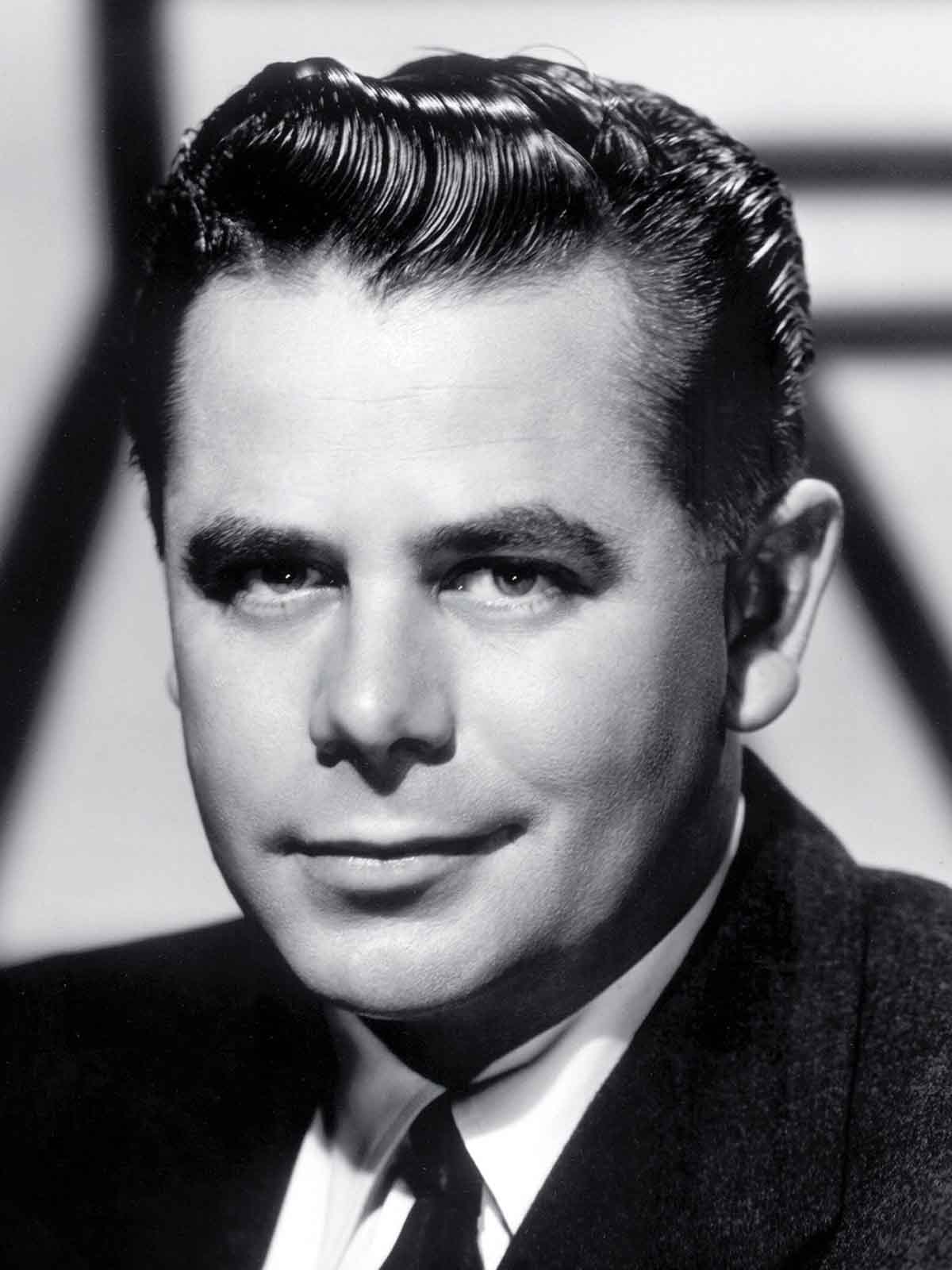
People were always inclined to feel this way about Glenn. “I looked forlorn,” I guess,” he has remarked, referring to his pre-service days, “because I was inclined to brood, subject to spells of depression. I had never learned how to have fun, you see. Being an only son, my father’s death made me the head of the family when I was just out of high school. I grew up by myself. I didn’t make friends easily and I wasn’t considered good company.”
Glenn realized that it was a sense of kindness that prompted people to help him and, strangely enough, when he tried to discourage them he seemed to rob them of a kind of personal satisfaction. But there were times when he had to prove that he could look out for himself.
People, including Glenn, are also inclined to believe that the war years changed him. Formerly, he was afraid to say no to requests. Afraid of hurt feelings. As a result, he seemed always to be obligating himself to do what he least wished.
A year-and-a-half after his and Ellie’s marriage—just two months before Peter Newton Ford was born—Glenn got out of the service. It was just like beginning all over again, as far as his interrupted career was concerned. Glenn was making a small salary when he answered the call to arms. The unforgettable “Gilda” that shot him to the top was yet in the future, so he returned to the scale of living he had known before the war. Only this time there was a family to consider. The future was uncertain as far as progress and a better scale of living were concerned. Things are different now. However, outsiders believe that although he collected a six-figure salary for his role opposite Rita Hayworth in “Affair in Trinidad,” an inner conflict shows in his face.
That Glenn has changed, there is little doubt. He hardly seems the same fellow who proposed to his girl over a soda in an ice cream parlor. The Fords seldom entertain these days. Glenn’s former weekly poker parties with tried and true friends are a thing of the past. But people who have known Glenn Ford along the way have always said that you never really do know him—that just when you feel closest to him, he shuts you out. It’s something he can’t help. And that must make a happily married life difficult.
It would seem that Glenn has everything one man would want out of life—a wife who certainly loves him, a fine son, a flourishing career that now pays off in huge hunks. He was handsomely paid for making “Time Bomb” in England recently. Perhaps it has been his intense fight for security for his family that has made the difference.
When you sum it all up, it takes you right back to his very first picture of any importance—the picture that got one foot inside the Hollywood gates for Glenn. The picture was called “Heaven With a Barbed Wire Fence,” and the unknown Ford was acclaimed by critics. It would seem—sitting en the outside and looking at Glenn on the inside—that this is the life he has made for himself today . . . heaven with a barbed wire fence!
THE END
It is a quote. PHOTOPLAY MAGAZINE NOVEMBER 1952


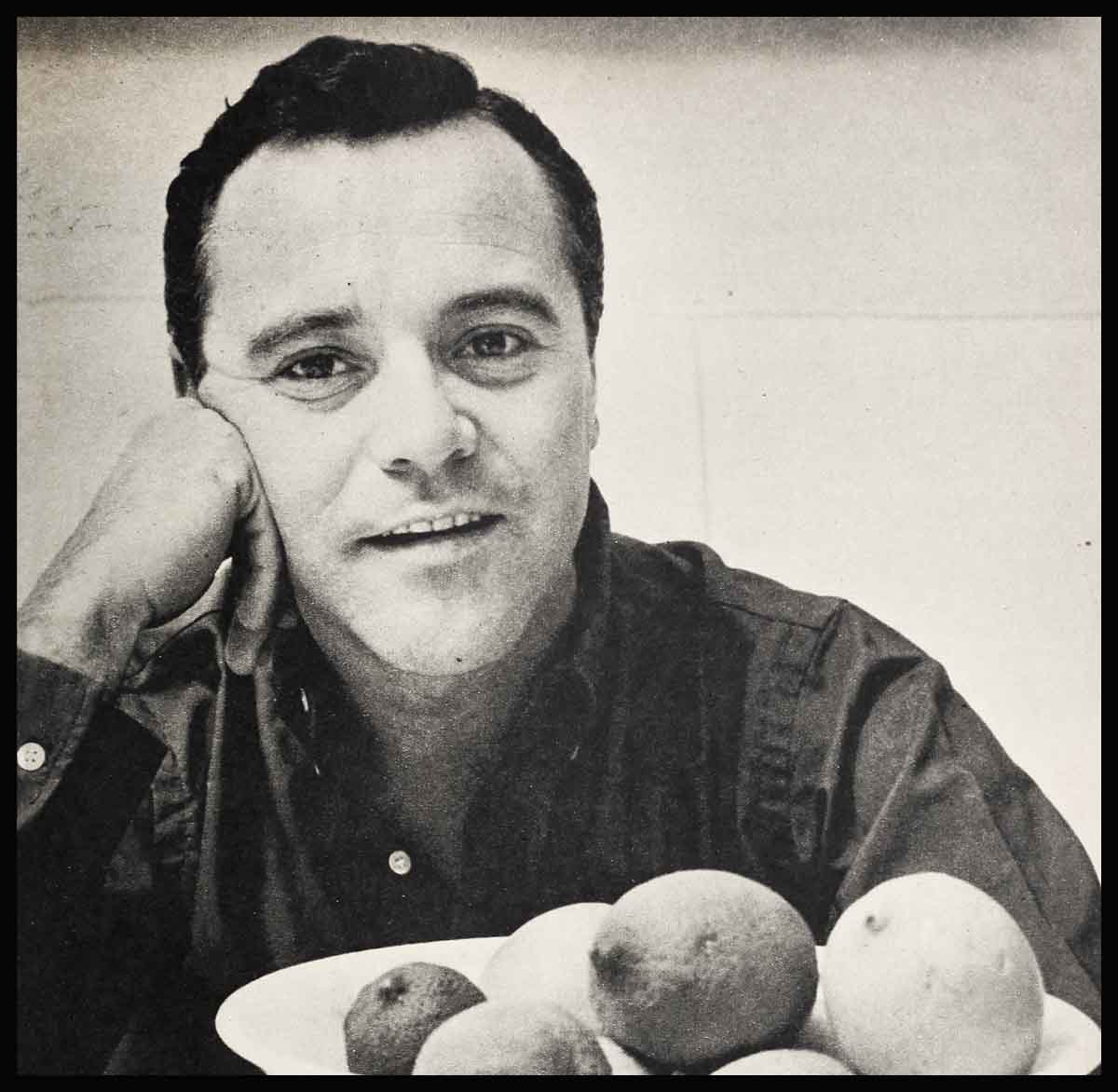


No Comments